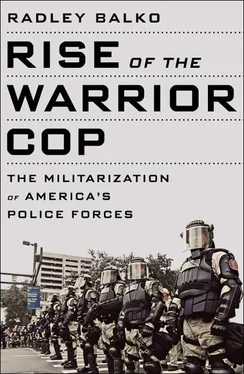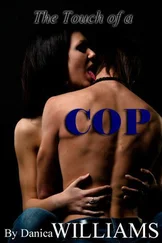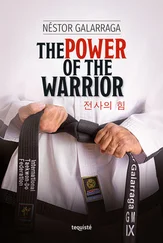Why can’t investigators handle common drug offenders the same way? A big reason is a lack of resources. If your department is serving several drug warrants a day, you just aren’t going to have the personnel to come up with that sort of plan for each one. A second reason is that drug offenders simply aren’t all that likely to shoot at cops, and it’s easier to use violent tactics against people who aren’t going to fire back. It’s by no means a universal rule, but often when police do face a genuinely violent suspect like an escaped fugitive with a violent history, a suspect in a series of violent crimes, or a barricade or hostage situation, they don’t immediately storm the place. They set up a perimeter or try to figure out other ways to make the arrest safely. This again isn’t possible with drug warrants—there are just too many of them. But because drug dealers aren’t all that dangerous, it works out to raid them instead.
Police today are also given too little training in counseling and dispute resolution, and what little training they do get in the academy is quickly blotted out by what they learn on the street in the first few months on the job. When you’re given an excess of training in the use of force but little in using psychology, body language, and other noncoercive means of resolving a conflict, you’ll naturally gravitate toward force. “I think about the notion of command presence ,” Stamper says. “When you as a police officer show up at a chaotic or threatening or dangerous situation, you need to demonstrate your command presence—that you are the person in command of this situation. You do this with your bearing, your body language, and your voice. What I see today is that this well-disciplined notion of command presence has been shattered. Cops today think you show command presence by yelling and screaming. In my day, if you screamed, if you went to a screaming, out-of-control presence, you had failed in that situation as a cop. You’d be pulled aside by a senior cop or sergeant and made to understand in no uncertain terms that you were out of line. The very best cops I ever worked around were quiet. Which isn’t to say they were withdrawn or passive, but they were quiet. They understood the value of silence, the powerful effect of a pause.”
Stamper adds that these things aren’t emphasized anymore. “Verbal persuasion is the first tool a police officer has. The more effective he or she is as a communicator, the less likely it is he or she is going to get impulsive—or need to.” 26
Neill Franklin suggests that deteriorating physical fitness at police departments can also lead to unnecessary escalations of force—another argument in favor of foot patrols over car patrols. “When I was commander of training in Baltimore, one of the first things I did was evaluate the physical condition of the police officers themselves,” Franklin says. “The overweight guys were the guys who knew very little about arrest control and defensive strategy. Being a police officer is a physically demanding job. You can’t be so out of shape. When you are, you’re less confident about less lethal force. It can get so that the only use of force you’re capable of using is a firearm. You also fear physical confrontation, so you’re more likely to reach for your firearm earlier. Getting cops in shape is a confidence builder, and it gets people away from relying too much on the weapons they have on their belt.” 27
More generally, politicians should also be held accountable when they use war rhetoric to discuss crime and illicit drugs. Words do have an impact on the way police officers approach their jobs, and the way they view the people with whom they interact while on patrol. If we want to dissuade them from seeing their fellow citizens as the enemy, we need to stop our political leaders—the people who set the policies and appropriate the budgets for those officers—from referring to their fellow citizens as the enemy.
Accountability
In numerous states across the country, police unions have lobbied legislatures to pass variations on a “law enforcement bill of rights.” Though they vary from state to state, the general thrust of these laws is to afford police officers accused of crimes additional “rights” above and beyond what regular citizens get. Or as Reason magazine’s Mike Riggs puts it, the intent of such laws is “to shield cops from the laws they’re paid to enforce.” These laws have made it nearly impossible to fire bad cops in many jurisdictions, and worse, they have instilled in them the notion that they’re above the law—and above the regular citizens they’re supposed to serve. Investigations of how bad cops are able to stay on the job have become a perennial newspaper undertaking. Recent exposés have tackled the flawed systems in Florida, Georgia, Louisiana, West Virginia, and Chicago.
Part of the problem is that union-management negotiations in law enforcement are decidedly different from those in the private sector. For one, there’s little downside for a mayor or city council to give everything away. Voters rarely get angry at politicians for being too generous with the police. But when city officials face tight budgets, they can use accountability as a negotiating chip, offering more job protections for cops accused of wrongdoing in exchange for concessions on pay or benefits. A CEO who negotiates away his ability to hold his employees accountable is likely to feel the repercussions on his bottom line—it affects him directly. When city officials make it more difficult to fire bad cops, they are rarely affected that way. At worst, a lawsuit might take a bite out of a city budget. But no cops will be harassing or beating the politicians themselves. That happens to other people.
Police unions also help enforce the “Blue Code of Silence,” the unwritten rule that police officers never rat out or testify against other police officers. A stark example from several years ago in New Mexico involved, oddly enough, former race car driver Al Unser Sr. In 2006 Albuquerque police officer Sam Costales testified against some deputies from the Bernalillo County Sheriff’s Department. The deputies had gotten into a confrontation with Unser that resulted in Unser’s arrest and criminal charges. Costales had witnessed the incident. At Unser’s trial, he testified that Unser did not assault or threaten officers from the Bernalillo County Sheriff’s Department, as claimed in police reports. Costales’s testimony helped Unser win an acquittal.
None of the Bernalillo deputies was disciplined. But one officer was: Sam Costales. His own chief opened an internal affairs investigation of him. Costales’s transgression: he wore his police uniform when he testified in Unser’s case. Albuquerque cops apparently are permitted to wear the uniform when they’re testifying for the prosecution, but not when they’re testifying for the defense. At that point, the Albuquerque police union got involved—but not to protect Officer Costales. He may have been disciplined for telling the truth, but for the union he committed the far more serious offense of telling an unflattering truth about his fellow cops. James Badway, secretary of the Albuquerque Police Officers Association, apologized for Costales’s actions in an email message to the Bernalillo sheriff:
As Secretary of the APOA I feel it is my duty and responsibility to apologize to you and your officers. Ofc. Sam Costales does not represent APD/APOA. The majority of our officers look at the BCSO as our brother and sisters in blue. We are embarrassed and ashamed of Ofc. Costales’s testimony in the Unser trial. If there is anything we can do to rebuild the damage caused by Sam please let me know. 28
Only in law enforcement would a union rep apologize to the management for the actions of one of its members. Former narcotics cop Russ Jones says that unions reinforce the notion among cops that it’s just them and their brother cops against the world. “Police unions have really gotten to the point where they protect bad police officers, and they shield management from having to take any responsibility,” Jones says. “Everybody involved in the bargaining wins. The citizens end up the losers, in all aspects.” 29
Читать дальше












